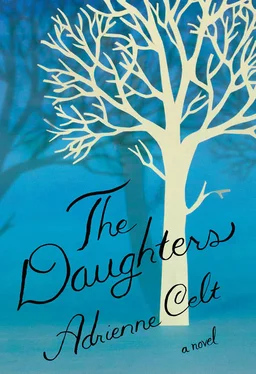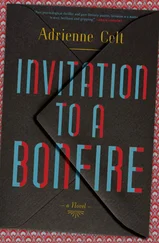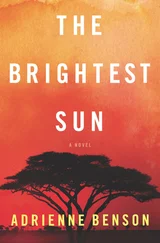“So where’s Konrad?”
Ada just blinked at me.
“And Fil? And Andrzej? Where did your brothers go? Why aren’t they here?” If Greta is safe , I wanted to ask, and you’re safe, why didn’t she save them too?
My baba pressed her lips together, considering. “Darling,” she said. “I think you’re trying to put me off. I think you don’t want to practice your scales.”
I shook my head. She knew that wasn’t true. Her eyes told me so.
“I think you need to go to your room and think about what you’re saying. Maybe when you come back out you’ll be ready to practice again, like a good girl.”
We stared each other down for a moment; then I spun on my heel and ran out of the room. Lying on my bed, I did exactly what she asked — thought about my questions, and thought about Ada’s answers too. All the girls, buried in the yard. All the girls, safe with Greta.
Except one.
It’s unsettling to think that I’m still looking for my lost family all these years later: one more of Greta’s daughters tucked into the soil. I know it’s crazy, but part of me thinks, There’ll be a sign . Ada wouldn’t just leave me. As I step outside the apartment building, my phone rings again from the bowels of my purse, and I think, It’s starting . I answer without even checking the caller ID.
“Lu?” On the other end of the line, John sounds frantic. “Are you all right? I’ve been calling.”
“I’m fine.” I feel a little numb — just John. What did I expect? “I was in the shower.”
I hear him sit down as he says, “Oh,” and can in an instant imagine him exactly. On break from rehearsal, hiding from the elementary school audience in the singer’s greenroom, sitting on the old leather couch. Stirring honey into his midday cup of peppermint tea. His flushed cheeks. The chintzy tinkle of a cheap steel spoon in a microwaveable ceramic mug. He never really liked children before Kara was born, which is one reason his sudden devotion to the image of our perfect family unnerves me. That, and the fact that it can’t last. Once the truth is out, then what?
“Well,” he finally says, “any plans for the day?”
“Yes.” I readjust Kara with one hand, tuck the phone between my chin and shoulder with the other. “Ada.”
“What?” Concern creeps back into John’s voice.
“We’re going to see Ada.” I pause, letting him think I’m crazy. “Bring flowers.” I pause again. “To the cemetery , John.”
“Today? In this?” I imagine him gesturing to the weather, which, from his windowless room, he can’t see.
“We’ll be fine.”
John hesitates.
“Be careful, Lu,” he says. “Be gentle with yourself.”
He has no idea how much loss a person can stand.
Of course, I haven’t lost him yet. So maybe neither do I.
Kara’s infant form switches around in every Greta story; she’s bundled up inside them like a tiny egg. In Greta you can see us all, descending from her like wooden nesting dolls. But when I was a girl I thought the view stopped with me. That when my baba Ada braided my hair or led me through scales, I was the last note in the song, the last line in the tale. The little queen our family machine was built to make.
In her time, my mother, Sara, thought so too. I couldn’t know, as a child, what a surprise I’d been to her. All I saw was that she was suspicious of me. That she wanted to keep me close, but didn’t know how to stay.
If she was bored she picked up my hand, so much smaller than hers even I could see it was delicate, and clipped off the raw, smiling ends of my nails. If she was in a good mood, she’d file them down with her many emery boards, each possessing its own subtle use. And she’d pick a candy color she felt suited me and paint my nails until they resembled jelly beans.
“Okay,” she’d say. “Now blow on them. And don’t move. You can’t move until they’re dry because you’ll muck around with something and mess them up.” Then she’d frown. “I’m not doing this over again. So you’d better keep them neat.”
So I would sit. Sara disappeared into her room or out into the day, but I remained perfectly still, to show her I could. When Ada happened by — ten minutes later, sometimes an hour — she would find me in my small wooden kitchen chair, practicing my mother’s frown. My hands would be laid out on the table in front of me, itching on the palms and starting to twitch impossibly, with my fingers each separated by the width of a cotton ball.
The first time she discovered me this way, Ada sat across from me and smiled as if we were playing a game.
“What are you doing?”
I didn’t look up. It seemed important to maintain focus on my nails.
“I have to wait for them to dry. Otherwise I’m going to mess them up.”
Ada made a small aah and came over to me, picking up one of my hands in her own. “So when will these be dry?” she asked. “They look dry to me.”
I scowled. “You can’t tell by looking.”
“So touch one.”
“I’m not allowed.”
“Oh,” she said. “Well.”
We sat quietly together for some time. The beams of sun coming through the window traveled across the waxcloth on the table and crept up my wrists. At last Baba Ada stood up and stretched her arms, pressing her nails into her palms and then wiggling her fingers, balling her hands up and then extending them so her arms looked like wings.
“Sitting here is making me stiff, lalka . I’m going to go get a hot chocolate,” she said. “I was going to invite you, but I can see that you’re busy. So I suppose I’ll just have to go alone.” She walked out into the hall, still talking back at me as she put on her coat. “It’s too bad. A long way to go by myself, since I don’t have a book to read on the train ride. And I’ll be awfully lonely if I have to wait for a table. But there’s nothing to be done.”
Before she had fitted her key to the lock, I sprang from my seat and threw myself against the door. Ada came back in and wrapped me up against the wind outside, making sure that my scarf and hat matched the new grown-up color of my nails. Sitting pressed together on the train, rocking back and forth as we traveled towards a bus exchange, Ada told me about Greta’s home in Poland: about what had been and what was to come. I leaned into her on the turns and let the words seep beneath my skin, as the light had in our small kitchen.
I knew that Ada was trying to make me feel better about the fact that my mother had left me alone. What I didn’t understand was that once upon a time, my mother had heard these stories too. That she’d been petted and painted and made to believe she was whole, until one day she cracked open and out I came: a smaller doll with a sleeker voice.
Ada taught us both that Greta’s magic set our family line in motion: women who came from women, women who came with music. Each woman a better singer, a more perfect form. When I was a girl I couldn’t see that in these stories, Kara was implied by my very existence. That I was required to improve on my mother, and that the day would come to improve on me.
My first major role was almost Mélisande from Debussy, and it was so boring that I cried the first time I ran through it with Baba Ada, who was at that point still my de facto voice coach. You barely need a soprano for the part, and I just think the libretto is ridiculous, with its all-too-fragile heroine and her darkly fated loves. I was an apprentice at the Lyric back then, allowed occasionally to fill in soubrette roles, like the Massenet, and pretend I wasn’t biting my fingernails to pieces every time a new show was being cast. So when they decided to give me a genuine debut, whispering the news in my ear and giving me a champagne toast, I was meant to be very grateful.
Читать дальше












